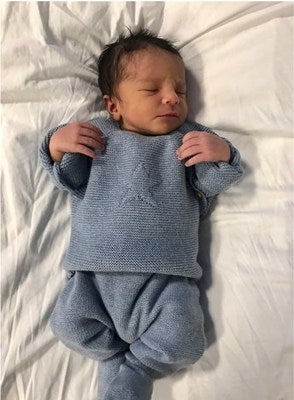Same-sex couple become first in world to carry baby in both of their wombs
‘It’s definitely brought us closer together emotionally,’ Donna Francis-Smith says
Your support helps us to tell the story
From reproductive rights to climate change to Big Tech, The Independent is on the ground when the story is developing. Whether it's investigating the financials of Elon Musk's pro-Trump PAC or producing our latest documentary, 'The A Word', which shines a light on the American women fighting for reproductive rights, we know how important it is to parse out the facts from the messaging.
At such a critical moment in US history, we need reporters on the ground. Your donation allows us to keep sending journalists to speak to both sides of the story.
The Independent is trusted by Americans across the entire political spectrum. And unlike many other quality news outlets, we choose not to lock Americans out of our reporting and analysis with paywalls. We believe quality journalism should be available to everyone, paid for by those who can afford it.
Your support makes all the difference.A same-sex couple has become the first in the world to carry the same baby in both their wombs as part of a landmark “shared motherhood” procedure.
British couple Jasmine and Donna Francis-Smith welcomed their son, Otis, two months ago.
The baby was born via in vivo natural fertilisation, which involves the eggs being incubated in the mother’s body, rather than externally, as is the case with in vitro fertilisation (IVF).
The AneVivo procedure, which was pioneered by Swiss technology company Anecova and carried out at the London Women’s Clinic, involved the eggs of the biological mother being placed inside a miniature capsule and inserted into her womb, where they were incubated.
After the incubation of the eggs, they were taken out of the first mother’s womb and placed into the womb of the gestational mother, who carried the baby to term.
Lance Corporal Donna, from Nottinghamshire, told The Telegraph she and Jasmine feel “overwhelmed” by the attention their unique pregnancy story has received.
“You get a lot of same-sex couples where one person is doing the whole thing, and the one person is getting pregnant and giving birth, whereas with this we’re both involved in a massive way,” she said.
“It’s definitely brought us closer together emotionally. We’re a close couple anyway but we both have a special bond with Otis as well which was helped by the way we’ve done it.”
Donna explained that she incubated her egg for 18 hours before it was placed in Jasmine’s body.

Jasmine, a dental nurse from Northamptonshire, said the couple feels “really fortunate” that the first attempt at IVF was successful “because the reality is that it doesn’t work first time for a lot of people”.
Dr Kamal Ahuja, the managing and scientific director of London Women’s Clinic, stated: “London Women’s Clinic has been in the forefront of fertility treatment since 1985 and it’s our great pleasure to report the first birth in the world with shared motherhood using Anecova’s groundbreaking technology for in vivo natural fertilisation.”
Martin Velasco, the founder and CEO of Anecova, said the technology firm believes its AneVivo procedure has the “potential to bring significant value to London Women’s Clinic’s already well-established shared motherhood programme, particularly since it enhances the emotional value for the couple”.
The average cost of a cycle of in vitro fertilisation is £5,000, the Human Fertilisation and Embryology Authority states.
The success rate is approximately 29 per cent for women under the age of 35, 23 per cent for women aged between 35 and 37, and 15 per cent for those aged between 38 and 39.
The average success rate for women undergoing IVF has peaked at one in four, a study found earlier this year.

Join our commenting forum
Join thought-provoking conversations, follow other Independent readers and see their replies
Comments